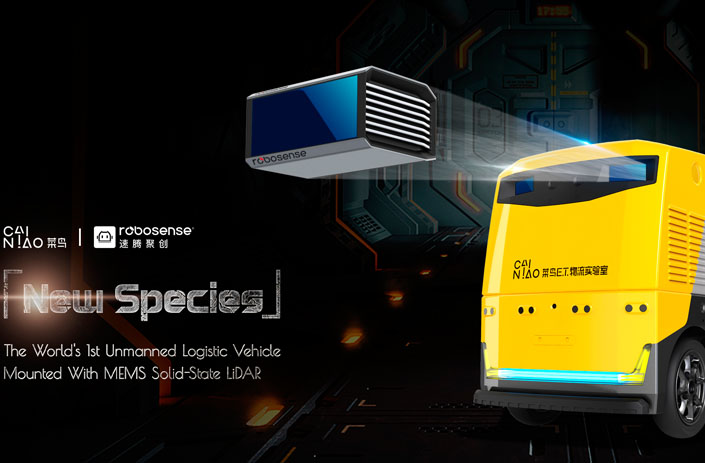A partnership between Cainiao Network, a subsidiary of the Alibaba Group responsible for logistics, and RoboSense, a provider of lidar solutions for the automotive industry, will bring driverless delivery vehicles to the streets.
Equipped with three RoboSense RS-LiDAR-M1Pres, two in the front and one in the rear, Cainiao’s G-Plus driverless delivery vehicle can “clearly see the direction of travel: shape, distance, azimuth, travel speed, and direction of travel of pedestrians, cars, trucks, as well as exact areas to drive, ensuring smooth flow of unmanned logistics vehicles in complex road environments.” It drives at under ten miles per hour, or six if there are people or cars around, and once it reaches the destination, the G-Plus will automatically deposit the package or a customer can walk up, enter a PIN code, and retrieve the delivery.
Showcased at CES 2018, RoboSense’s first MEMS solid-state lidar RS-LiDAR-M1Pres features a detection range of up to 200 meters, a field-of-view (FOV) of 63º x 20º, a resolution of 0.09º x 0.2º, and a 20 frames-per-second (fps) refresh rate. Although designed for autonomous vehicles, the sensor also works for mapping, UAV, industrial, and security applications.
Furthermore, Robosense says that while traditional mechanical multi-beam lidar require more than a hundred laser transmitters and receivers to simultaneously rotate and scan, increasing costs and reducing yield and reliability, the RS-LiDAR-M1Pres MEMS micromirror scanning scheme requires only a few laser emitters and receivers to scan the MEMS micromirror in both directions. This results in a low-cost and easy-to-mass-produce product.
“The solid-state laser has the advantages of high stability, high resolution, and low cost, and it can well meet the demand for OEMs,” said Mark Qiu, Co-founder and COO of RoboSense. “Reducing logistics costs and improving logistics efficiency is the mission of autonomous driving technology in the logistics industry.”
The driverless delivery vehicle is currently in testing on roads around Cainiao’s headquarters in Hangzhou, and the company expects to start commercial production by the end of 2018.
In addition to this announcement, Cainiao Network will join a number of companies, including FAW Jiefang, Beihang University’s Drone Team, RoboSense, and Dian Wo Da, for the “Hump Project,” which aims to mass-produce unmanned equipment for a new three-dimensional intelligent logistics network that includes unmanned vehicles and drones.
“We want to build a three-dimensional distribution network. After a package enters the network, artificial intelligence will automatically distribute routes and unmanned vehicles will relay deliveries,” said Zhang Chunhui, director of the Cainiao Network E.T. Logistics Laboratory. “We plan to have 100,000 unmanned vehicles in the next three years”.






